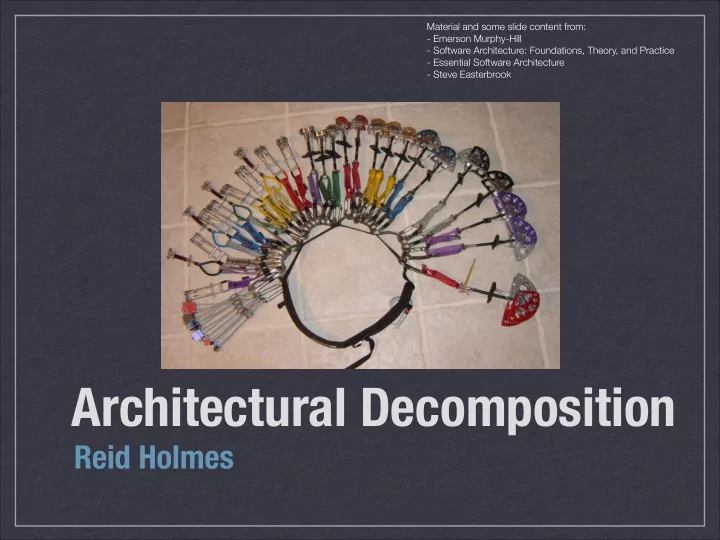

Material and some slide content from: - Emerson Murphy-Hill - Software Architecture: Foundations, Theory, and Practice - Essential Software Architecture - Steve Easterbrook Architectural Decomposition Reid Holmes
What is SW architecture? ‣ Definition: “The set of principal ! design decisions about ! the system” ! ‣ Blueprint for construction and evolution. ‣ Encompasses: ‣ Structure ‣ Behaviour ‣ Non-functional properties REID HOLMES - SE2: SOFTWARE DESIGN & ARCHITECTURE
Components ‣ Elements that encapsulate processing and data at an architectural level. ‣ Definition: ‣ Architectural entity that: ‣ encapsulates a subset of functionality. ‣ restricts access via explicit interface. ‣ has explicit environmental dependencies. REID HOLMES - SE2: SOFTWARE DESIGN & ARCHITECTURE
Connectors ‣ Definition: ‣ An architectural entity tasked with e ff ecting and regulating interactions between components. ‣ Connectors are often more challenging than components in large heterogenous systems. ‣ Often consists of method calls, but be much more. ‣ Frequently provide application-independent interaction mechanisms. REID HOLMES - SE2: SOFTWARE DESIGN & ARCHITECTURE
Configurations ‣ Bind components and connectors together in a specific way. ‣ Definition: ‣ An architectural configuration, or topology, is a set of specific associations between the components and the connectors of the system’s architecture. ‣ Di ff erentiates a bag of components and connectors from an implementable system. REID HOLMES - SE2: SOFTWARE DESIGN & ARCHITECTURE
Topological Goals ‣ Minimize coupling between components ‣ The less components know about each other, the better (also known as information hiding). ‣ Maximize cohesion within each component ‣ Components should be responsible for a logical service; extraneous functionality should not be present. X [Steve Easterbrook: http://www.cs.toronto.edu/~sme/CSC302/notes/04-package-diagrams.pdf] REID HOLMES - SE2: SOFTWARE DESIGN & ARCHITECTURE REID HOLMES - SE2: SOFTWARE DESIGN & ARCHITECTURE
Abstraction ‣ Complex problems can be approached by abstracting away unnecessary detail ‣ Focus on the key issues while eliding extraneous detail (some of these details will be pertinent during more detailed design activities) ‣ In software two classes of abstraction dominate: ‣ Control abstraction ‣ (e.g., structured programming) ‣ Data abstraction ‣ (e.g., abstract data types) REID HOLMES - SE2: SOFTWARE DESIGN & ARCHITECTURE
Decomposition ‣ Top-down abstraction is also called decomposition ‣ Break problem into independent components ‣ Describe each component ‣ Criteria for decomposition can include: ‣ Implementing teams ‣ Application domains (aka obvious partitions) ‣ Parallelization ‣ Make typical cases simple, and exceptional cases possible REID HOLMES - SE2: SOFTWARE DESIGN & ARCHITECTURE
Conway’s Law “The structure of a software system reflects the structure of the organization that built it” REID HOLMES - SE2: SOFTWARE DESIGN & ARCHITECTURE
Conway’s Law People A H J D G B C I F K L E Modules 10 1 8 7 3 4 9 2 11 12 6 5 [Steve Easterbrook: http://www.cs.toronto.edu/~sme/CSC302/notes/04-package-diagrams.pdf] See: Valetto, et al., 2007. REID HOLMES - SE2: SOFTWARE DESIGN & ARCHITECTURE
Architectural representations ‣ Software architecture is fundamentally about facilitating technical communication between project stakeholders ‣ An opaque architecture has no value as it will not be adequately understood ‣ Properties of representations: ‣ Ambiguity: Open to more than one interpretation? ‣ Accuracy: Correct within tolerances ‣ Precision: Consistent but not necessarily correct REID HOLMES - SE2: SOFTWARE DESIGN & ARCHITECTURE REID HOLMES - SE2: SOFTWARE DESIGN & ARCHITECTURE
Architectural views ‣ Architectural models can be overwhelming ‣ Di ff erent views focus on specific subsets of elements or subsets of relationships ‣ Views often focus on specific concerns or scenarios within a system ‣ Views overlap; maintaining consistency between views is challenging REID HOLMES - SE2: SOFTWARE DESIGN & ARCHITECTURE
Component diagram ‣ Captures components and relationships. ‣ Required and provided APIs explicitly recorded. IBM [http://www.ibm.com/developerworks/rational/library/dec04/bell/] REID HOLMES - SE2: SOFTWARE DESIGN & ARCHITECTURE REID HOLMES - SE2: SOFTWARE DESIGN & ARCHITECTURE
Sequence diagram ‣ Focus on inter-component collaboration. ‣ Capture behaviour for specific runtime scenarios. REID HOLMES - SE2: SOFTWARE DESIGN & ARCHITECTURE REID HOLMES - SE2: SOFTWARE DESIGN & ARCHITECTURE
Deployment diagram ‣ Provide mapping between physical devices VP [http://www.visual-paradigm.com/VPGallery/diagrams/Deployment.html] REID HOLMES - SE2: SOFTWARE DESIGN & ARCHITECTURE REID HOLMES - SE2: SOFTWARE DESIGN & ARCHITECTURE
Statechart diagram ‣ More formal description of system behaviour. ‣ Poor mapping between states and components. REID HOLMES - SE2: SOFTWARE DESIGN & ARCHITECTURE REID HOLMES - SE2: SOFTWARE DESIGN & ARCHITECTURE
Prescriptive vs descriptive ‣ Prescriptive architecture dictates how the system will be built a priori . ‣ (as-conceived) ‣ Descriptive architecture captures how the system was actually built after the fact. ‣ (as-implemented) REID HOLMES - SE2: SOFTWARE DESIGN & ARCHITECTURE REID HOLMES - SE2: SOFTWARE DESIGN & ARCHITECTURE REID HOLMES - SE2: SOFTWARE DESIGN & ARCHITECTURE
Architectural degradation ‣ Drift ‣ Introduction of changes that are not captured in the current architecture but do not violate it. ‣ Erosion ‣ Introduction of changes that violate the current architecture. REID HOLMES - SE2: SOFTWARE DESIGN & ARCHITECTURE REID HOLMES - SE2: SOFTWARE DESIGN & ARCHITECTURE REID HOLMES - SE2: SOFTWARE DESIGN & ARCHITECTURE
Architectural recovery ‣ [ICSE 1999: Bowman, Holt, and Brewster] ‣ Conceptual architecture ‣ How developers think about the system. ‣ Focuses on meaningful relationships. ‣ Concrete architecture ‣ How the system was actually built. ‣ Necessary: the devil is in the details. REID HOLMES - SE2: SOFTWARE DESIGN & ARCHITECTURE REID HOLMES - SE2: SOFTWARE DESIGN & ARCHITECTURE REID HOLMES - SE2: SOFTWARE DESIGN & ARCHITECTURE
Recommend
More recommend